Have you ever noticed how much water your dog usually drinks per day?
Does it seem to you that your dog may be drinking a lot of water lately?
Today you will learn all about how to determine whether your dog is drinking excessive amounts of water, what are the possible causes, and also some solutions to this quite common problem.
By the way, the medical term for this is polydipsia.
The level of thirst or water-absorbing requirement depends on many factors, including weight, environment, weather, or simply a dog’s diet. However, it can be all about diseases and disorders, too.
In order for your pal to stay healthy, you should eliminate all the factors that may lead to this and do everything in your power to prevent an excessive intake of water.
The first step to that is reading this article!
Last Updated: [todaysdate format=”F jS Y”]
How To Track Your Dog’s Water Regulation: The Formula
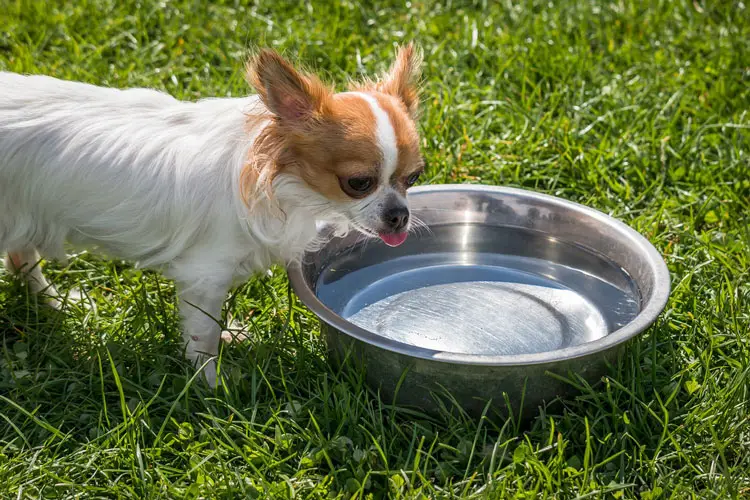
Hooman, gib. water.
Before you read about the causes and solutions, you first need to determine whether your dog is indeed drinking a lot of water, or it is your subjective feel.
A thirsty doggo in slow-mo
So, what is the norm?
Normally, dogs drink about 30 ml. or 1.01 ounces of water per pound of weight every day. Divide your dog’s weight in pounds by 2.2 to get his weight if you want to convert it to kilograms.
For example, the calculation for the optimal daily intake of water for two dogs, who weigh 25lbs and 7lbs (the former is something like a chihuahua in the picture) looks like this:
So, feel free to implement this formula and start tracking the water intake of your dog. If it deviates significantly from the optimal value, that is a sign that your dog is drinking a lot of water, and it’s time to start searching for reasons.
Why Is Your Dog Drinking a Lot of Water?
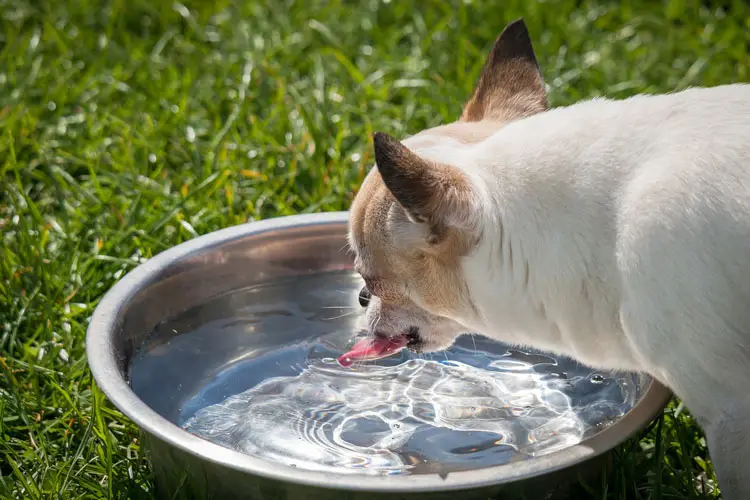
Slurp… Slurp… Slurpppp…
In order to help your best friend, you must first identify the reason behind drinking a lot of water.
Some probable causes include:
#1 Diet
A dry diet usually includes only 5% to 10% water, leading to dogs’ thirst. This happens to humans as well as dogs. Diets with high sodium levels can influence your dog to drink more water than usual.
One more thing to notice in your dog’s diet is salt. Large quantities of salt can be harmful to dogs. Human food that contains salt in a large amount, like crisps, should never be added to a dog’s diet.
Some common consequences of too much salt ingestion in dogs include:
- Tremors
- Diarrhea
- Depression
- Vomiting & tummy ache
- Kidney disease
If you have noticed some of these symptoms and problems, pay attention to whether your dog is drinking a lot of water. It can be a side effect of these diseases and a sign that you should keep an eye on your dog’s diet and salt intake!
Alternatively, learn about all the benefits of homemade dog food – that’s a perfect way of keeping the diet of your dog well-balanced and healthy. Make sure to especially pay attention to the notion of “wet food” and how to implement it.
#2 Dehydration
Unsurprisingly, the environment and weather can be reasons for your dog’s dehydration.
In hot summer months, your dog will dehydrate faster, especially if it’s active.
Under these conditions, your dogs are more likely to suffer from illness or infection.
Common symptoms and side effects include:
Getting lethargic
Dry gums and tongue
Thick and jelly-like saliva
Heavy panting
Here’s a video about additional symptoms of dehydration:
In any case, if you notice that your dog may be dehydrated, even when it is suffering from mild dehydration with no vomiting, you should NOT let them drink a lot of water, and keep them away from free access to water.
Instead, offer your pupper small amounts of clean water: 1 teaspoon for a little dog and 1-2 teaspoons for bigger dogs. Keep doing this every 10 minutes over the next few hours.
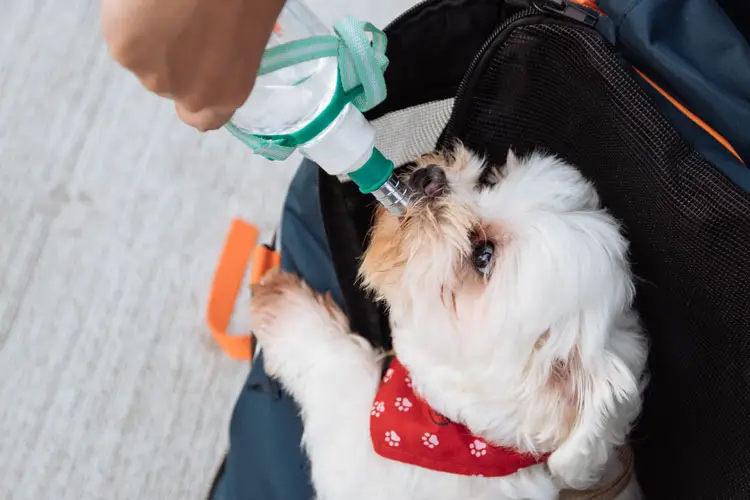
This might be the best way to control how much water you are giving to your dog.
This might be the best way to control how much water you are giving to your dog.
Caution: if vomiting or any other more severe symptoms happen, taking a dog to a vet is the best option.
#3 As a Side Effect of Various Illnesses and Diseases
There are many diseases and illnesses that can cause a dog to drink too much water. Some common ones include:
- Liver Disease
- Diabetes Mellitus
- Cushing’s disease
- Cancer
- Kidney disease
- Fever
- Infection
I want to focus on the three following diseases, as they are more common and most often co-occur with excessive water intake:
1. Diabetes Mellitus
The usual reason for diabetes is low production of insulin, or the body not responding to insulin anymore. Looking for glucose (sugar) in the urine or high blood sugar can be a good way to diagnose this illness. If the blood sugar goes over 200, glucose appears in the urine.
You can test your dog’s urine at home if you buy reagent strips, but it’s always advisable to confirm it with your vet, too.
Diabetes mellitus in dogs can be treated by injecting insulin twice a day under your vet’s guidance and supervision. For ketoacidosis cases, intensive treatment in the hospital is required for 3-5 days.
One thing to know is that a higher fiber diet might help improve the situation. To check out which of these foods are good for your pet, you can again consult the appropriate section in my article (“Fruits, veggie, and grains”).
2. Kidney Disease
As noted, increased water consumption can be a sign of kidney disease, too.
To diagnose kidney disease, blood tests and urinalysis should be used to see if your dog suffers from a simple injection or more severe deterioration of kidney function. Blood in urine is also an important marker to follow.
Along with treatment from your vet, a prescription diet with restricted, high-quality protein, and limited phosphorous should be implemented.
3. Cushing’s Disease
The root cause of Cushing’s disease is that adrenal glands make too much cortisol (otherwise known as the stress hormone) that affects the water regulation system in your dog’s body. Consequently, more urine leads to more water drinking.
Cushing’s disease slowly develops, with less urgency level than diabetes or kidney disease. It can be diagnosed with advanced blood tests and ultrasound.
4. Drugs
Some drugs can also cause your dogs to drink much more water than usual.
These include:
- Anti-inflammatory drugs, such as Prednisone. This drug is often used for asthma, allergies, and inflammatory bowel disease.
- Heart failure drugs, e.g., Furosemide. The effect of this drug is the need to urinate that causes the need for more water and vice versa.
- Seizure medication, for instance, Phenobarbital, can cause excessive thirst in dogs.
What to Do When Your Dog Is Drinking a Lot of Water?
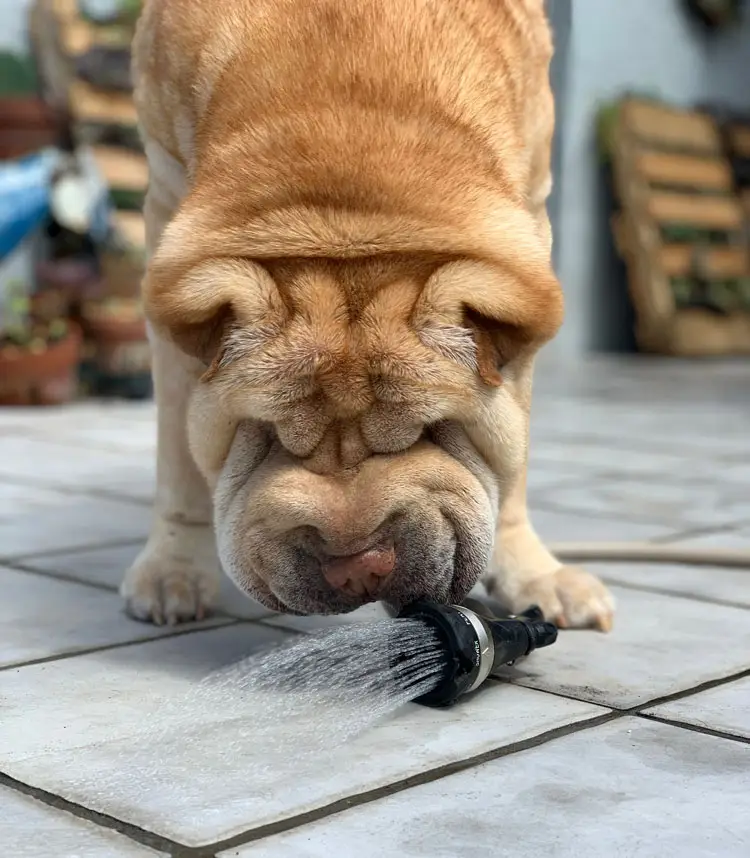
Busted!
If you’ve referred to the chart and concluded that your dog has been drinking a lot of water, here is what you can do to prevent further excessive intake, and, consequently, problems that may arise.
#1 Regulate Your Dog’s Diet.
As noted, eating too much salt and high-sodium derivatives can be dangerous for the dog, and it can make your dog intensely thirsty. The science behind this is that they cause an imbalance of electrolytes in the dog’s body.
Therefore, stay clear of giving your dog the following:
- Chips and other snacks
- Pretzels
- Processed meat, such as ham
- French fries
It’s better to resist those begging eyes than have them experience problems! They will be grateful to you (at least in the long run).
# 2 Create a Water-Drinking Routine.
However strange this may sound, you can develop a water-drinking routine with your pet.
This does not only mean that you can control the daily intake of water, but also that it will be easier to spot any irregularities and problems.
To do so, follow the simple steps:
- Calculate the amount of water your dog needs (I’ve explained this earlier)
- Fill the bowl approximately to that amount
- Fill the bowl at the same time each day (usually at the beginning of the day)
- When your dog goes to sleep, see how much is left.
#3 Go to the Vet.
First and foremost, you should make an appointment with your vet, especially if you’ve recognized polydipsia as a symptom of one of the underlying diseases I’ve written about in this article.
When your vet establishes the diagnosis, they will determine the appropriate treatment and/or change the drugs your dog is taking if that’s the cause.
Conclusion
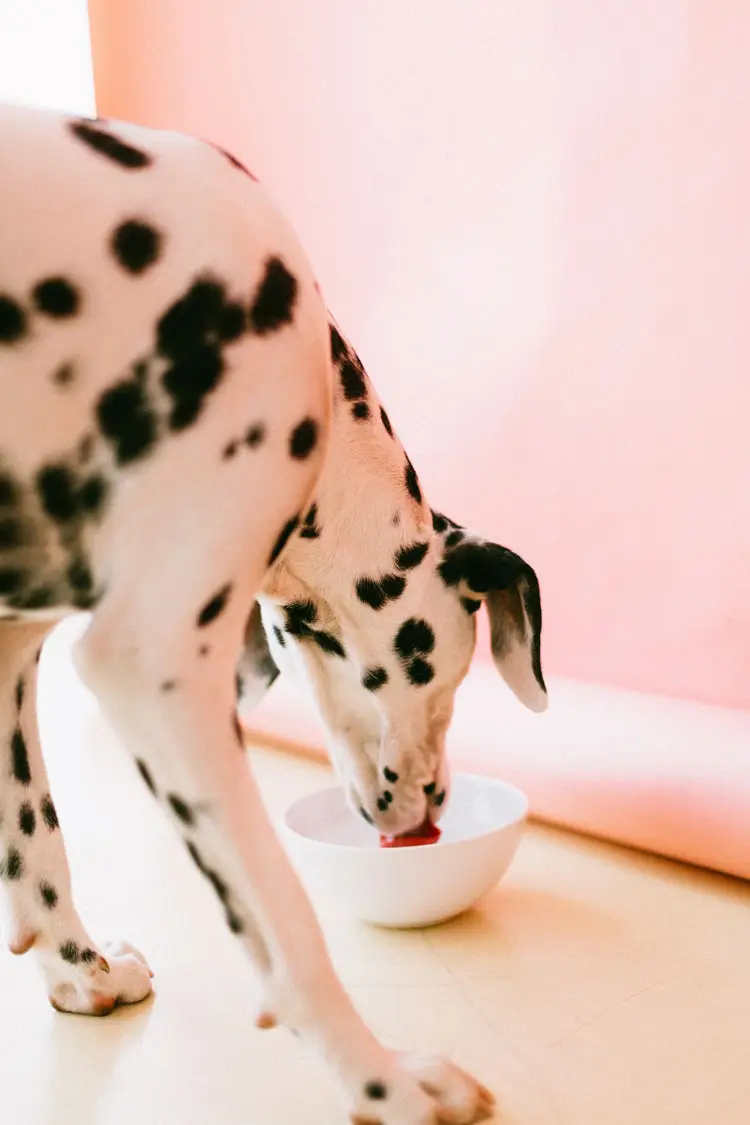
What I want to add at the end of this article is that water is one of the crucial things for the well-being of your dearest friend.
While it is not good that your dog is drinking a lot of water, the opposite is also not favorable. Never deprive your doggo of water!
The perfect balance is what they need, just like with everything.
I hope I helped you find an answer to your question: Why is my dog drinking a lot of water? and that now you’re aware of what you should do to prevent it.



